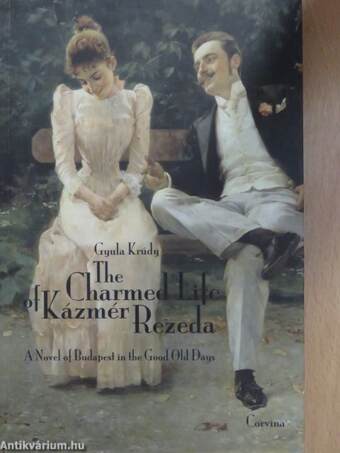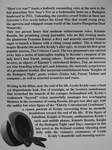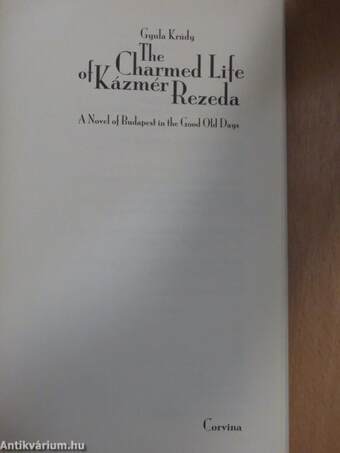1.072.895
kiadvánnyal nyújtjuk Magyarország legnagyobb antikvár könyv-kínálatát

VISSZA
A TETEJÉRE
JAVASLATOKÉszre-
vételek
The Charmed life of Kázmér Rezeda
A Novel of Budapest in the Good Old Days
| Kiadó: | Corvina Books Ltd. |
|---|---|
| Kiadás helye: | Budapest |
| Kiadás éve: | |
| Kötés típusa: | Ragasztott papírkötés |
| Oldalszám: | 184 oldal |
| Sorozatcím: | |
| Kötetszám: | |
| Nyelv: | Angol |
| Méret: | 22 cm x 14 cm |
| ISBN: | 978-963-13-6039-4 |
naponta értesítjük a beérkező friss
kiadványokról
naponta értesítjük a beérkező friss
kiadványokról
Fülszöveg
"Here's to war!" toasts a hollowly resounding voice at the next to the last peacetime New Year's Eve at a fashionable hotel on a Budapest boulevard in 1912. Unheeding, the carefree crowd frolics at these last Sylvester's Eve revels before the Great War that would sweep away the operetta and whipped cream world of the Áustro-Hungarian Dual Monarchy.
Only one person hears that ominous subterranean voice. Kázmér Rezeda, the promising young journalist, who on this evening meets the glamorous Fruzsina Kaiser, a fiery and neurotic married woman eager to Iaunch a liaison with a rising young author. She is about to inspire Rezeda (the novelist Krúdy's altér ego), to create his first great popular success, The Crimson Coach. The two paramours are carried away into a series of imbroglios leading to Rezeda's conquest of his lady love's best friend, among others. Further amorous adventures involve, as objects of Kázmér's varicolored desires, Tini, an innocent yet wise boarding school girl,... Tovább
Fülszöveg
"Here's to war!" toasts a hollowly resounding voice at the next to the last peacetime New Year's Eve at a fashionable hotel on a Budapest boulevard in 1912. Unheeding, the carefree crowd frolics at these last Sylvester's Eve revels before the Great War that would sweep away the operetta and whipped cream world of the Áustro-Hungarian Dual Monarchy.
Only one person hears that ominous subterranean voice. Kázmér Rezeda, the promising young journalist, who on this evening meets the glamorous Fruzsina Kaiser, a fiery and neurotic married woman eager to Iaunch a liaison with a rising young author. She is about to inspire Rezeda (the novelist Krúdy's altér ego), to create his first great popular success, The Crimson Coach. The two paramours are carried away into a series of imbroglios leading to Rezeda's conquest of his lady love's best friend, among others. Further amorous adventures involve, as objects of Kázmér's varicolored desires, Tini, an innocent yet wise boarding school girl, and Johanna, the matronly proprietress of a prominent brothel. Her nocturnal establishment hosts 'Knights of the Budapest Night', poets, writers (Endre Ady, Ferenc Molnár and company), as well as assorted eccentrics and roues.
Writing in his fifties, near the end of his life, Gyula Krúdy casts a fond yet dispassionate look, free of nostalgia, at the lovelorn melodramas that wrenched the innards of his younger, fíctionalized self. Krúdy's trademark "layered" vision masterfully montages two overlapping lifetimes in the encounter of young Rezeda, his pre-war altér ago, with the sadder but wiser figure of the "Elderly Convalescent Gentleman", a cameo portrait of Krúdy recovering from an alcoholic breakdown toward the end of his life. If the figure of Szindbád, Knight of Dreams, emblematizes Krúdy's early and middle phases, Kázmér Rezeda, Knight of the Budapest Night (and Day), emerges in this i late növel as the fictional creation vibrating most | fully with the visionary resonances of Gyula Krúdy's shambolic and stunning oeuvre. Vissza
Témakörök
- Idegennyelv > Idegennyelvű könyvek > Angol > Szépirodalom > Regény, novella, elbeszélés
- Szépirodalom > Regény, novella, elbeszélés > Tartalom szerint > Földrajzi besorolások > Magyarország > Budapest
- Szépirodalom > Regény, novella, elbeszélés > Tartalom szerint > Romantikus regények
- Szépirodalom > Regény, novella, elbeszélés > Az író származása szerint > Magyarország
- Szépirodalom > Regény, novella, elbeszélés > Tartalom szerint > Kor- és társadalomrajz
Gyula Krúdy
Gyula Krúdy műveinek az Antikvarium.hu-n kapható vagy előjegyezhető listáját itt tekintheti meg: Gyula Krúdy könyvek, művekMegvásárolható példányok
Nincs megvásárolható példány
A könyv összes megrendelhető példánya elfogyott. Ha kívánja, előjegyezheti a könyvet, és amint a könyv egy újabb példánya elérhető lesz, értesítjük.






